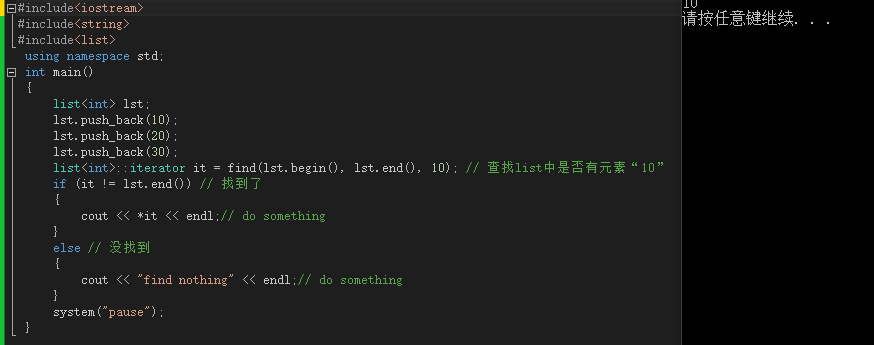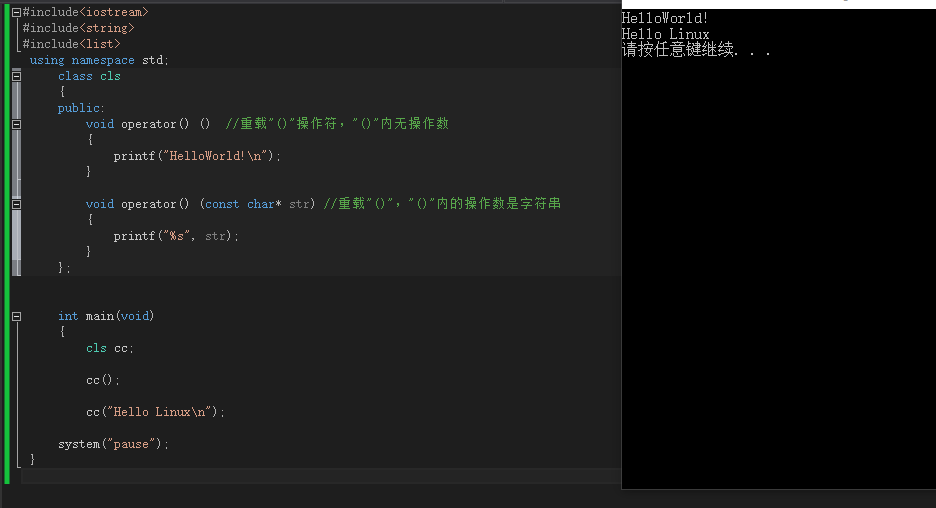总结:find_if针对查找的对象中包含指针需要进行比较
find则更偏向于普通的数值或者字符比较
两者都可以应用于自定义的类,只需在类中重载==运载符
函数调用符()说白了其实就是代替函数指针,调用对应重载的()的那个定义函数,()运算符只能在类中重载
STL的find,find_if函数提供了一种对数组、STL容器进行查找的方法。使用该函数,需包含头文件 #include <algorithm>
我们查找一个list中的数据,通常用find(),例如:
那么,如果容器里的元素是一个类呢?例如,有list<CPerson> ,其中CPerson类定义如下:
class CPerson
{
public:
CPerson(void);
~CPerson(void);
public:
int age; // 年龄
};
那么如何用find()函数进行查找呢?这时,我们需要提供一个判断两个CPerson对象“相等”的定义,find()函数才能从一个list中找到与指定的CPerson“相等”的元素。
这个“相等”的定义,是通过重载“==”操作符实现的,我们在CPerson类中添加一个方法,定义为:
bool operator==(const CPerson &rhs) const;
实现为:
bool CPerson::operator==(const CPerson &rhs) const
{
return (age == rhs.age);
}
然后我们就可以这样查找(假设list中已经有了若干CPerson对象)了:
list<CPerson> lst;
//////////////////////////////////
// 向lst中添加元素,此处省略
//////////////////////////////////
CPerson cp_to_find; // 要查找的对象
cp_to_find.age = 50;
list<CPerson>::iterator it = find(list.begin(), list.end(), cp_to_find); // 查找
if (it != lst.end()) // 找到了
{
// do something
}
else // 没找到
{
// do something
}
这样就实现了需求。
有人说,如果我有自己定义的“相等”呢?例如,有一个list<CPerson*>,这个list中的每一个元素都是一个对象的指针,我们要在这个list中查找具有指定age的元素,找到的话就 得到 对象的指针。 不只是普通需要比较类型上的相等,而是两个对象的指针所对应的值进行比较
这时候,你不再能像上面的例子那样做,
我们需要用到find_if函数,并自己指定predicate function谓词函数(即find_if函数的第三个参数,请查阅STL手册)。先看看find_if函数的定义:
template<class InputIterator, class Predicate>
InputIterator find_if(InputIterator _First, InputIterator _Last, Predicate _Pred);
Parameters
_First
An input iterator addressing the position of the first element in the range to be searched.
_Last
An input iterator addressing the position one past the final element in the range to be searched.
_Pred
User-defined predicate function object that defines the condition to
be satisfied by the element being searched for. A predicate takes single
argument and returns true
or false.
在这顺带说明一下()的函数调用符号()的重载,它只能通过类的成员来重载

在main()函数中,cc是一个类,但是”cc();”这样的语法却是函数调用,在项目中这样的写法可以避免代码出现函数指针
说白了,()其实就是函数指针的作用,代替了函数指针而已,在C++之后的java,就不存在指针了
我们在CPerson类外部定义这样一个结构体:
typedef struct finder_t
{
finder_t(int n) : age(n) { }
bool operator()(CPerson *p)
{ return (age == p->age); }
int age;
} finder_t;
然后就可以利用find_if函数来查找了:
list<CPerson*> lst;
//////////////////////////////////
// 向lst中添加元素,此处省略
//////////////////////////////////
list<CPerson*>::iterator it = find_if(lst.begin(), lst.end(), finder_t(50)); // 查找年龄为50的人
if (it != lst.end()) // 找到了
{
cout << "Found person with age : " << (*it)->age;
}
else // 没找到
{
// do something
引自https://blog.csdn.net/CNHK1225/article/details/48678203